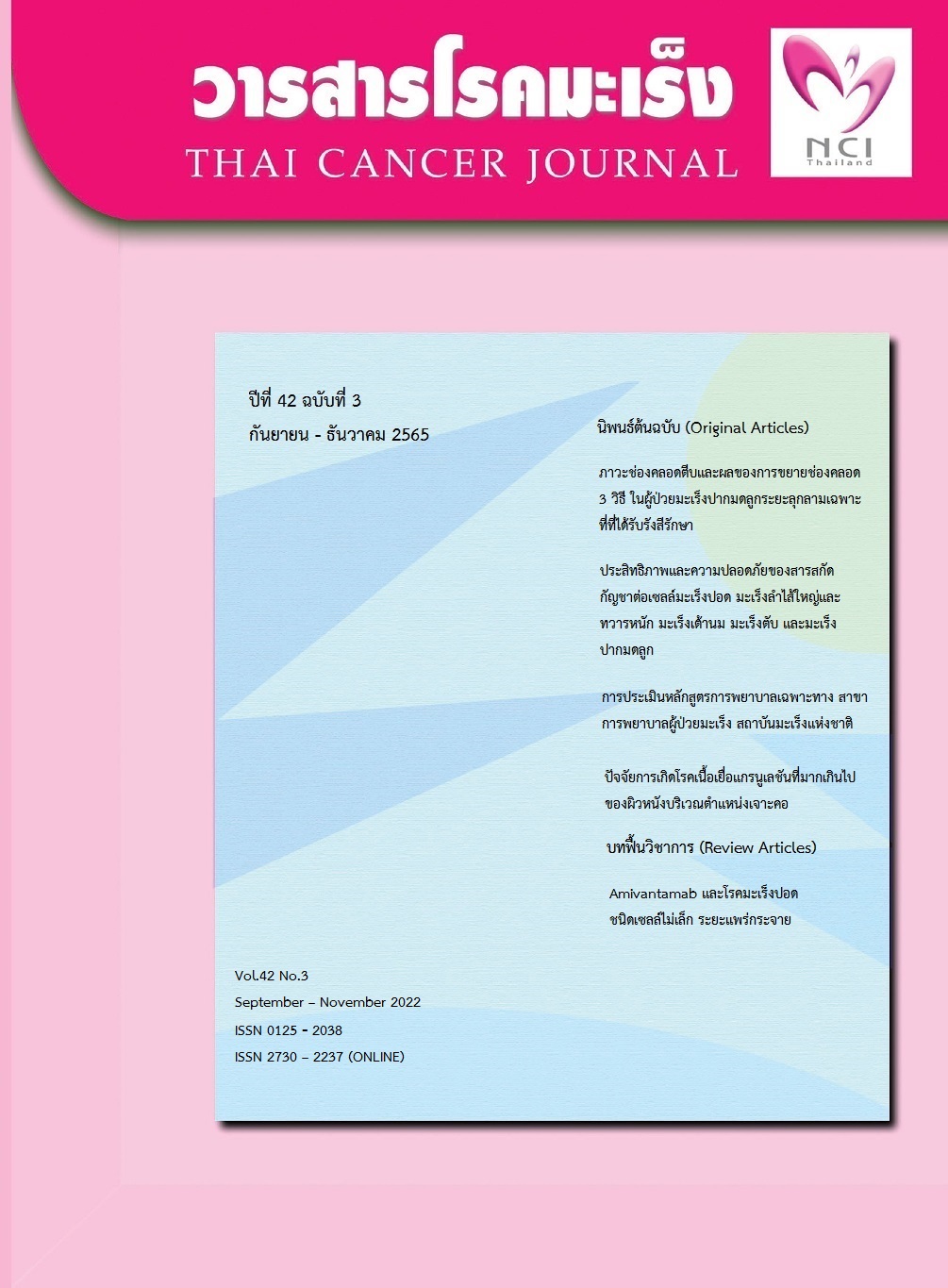Amivantamab: New approval for metastatic non-small cell lung cancer
Keywords:
amivantamab, non-small cell lung cancer (NSCLC), exon 20 insertion, mutationAbstract
Lung cancer is one of the most public health problems in many countries,including Thailand. Non-small cell lung cancer (NSCLC) is the most common type of lung cancer. The most important risk factor of lung cancer is smoking. Amivantamab is a fully human bispecific monoclonal antibody directed against epidermal growth factor receptor (EGFR) and mesenchymal epithelial transition factor (MET). Amivantamab binds to the extracellular domains of both EGFR and MET, thereby blocks their interactions with the cognate ligands, resulting in the disruption of these signaling pathways. Amivantamab is being developed for the treatment of adult patients with locally advanced or metastatic NSCLC harbouring EGFR Exon 20 insertion (Ex20ins) mutations, whose disease has progressed on or after platinum-based chemotherapy. The recommended dose of amivantamab is 1050 mg and 1400 mg in patients weighing < 80 kg and ≥ 80 kg, respectively, weekly for every 4 weeks, then every 2 weeks until disease progression or unacceptable toxicity. Serious adverse reactions reported in ≥ 2% of patients: pulmonary embolism, pneumonitis/ILD, dyspnea, musculoskeletal pain, pneumonia and muscular weakness. The most common (incidence ≥ 20%) adverse reactions were rash, infusion- related reaction, paronychia, musculoskeletal pain, dyspnea, and fatigue. Furthermore,there are unnecessary to adjust dose of amivantamab in patients with impaired renal and hepatic function in mild to moderate grade, but no study in severe grade. Moreover, age>65 years or <65 years are not affected on efficacy and safety in the current study trial. Amivantamab was approved by United States Food and Drug Administration as a first drug of choice in patients with locally advanced or metastatic NSCLC with EGFR Ex20ins mutation.
References
Bray F., Ferlay J., Soerjomataram I., Siegel RL., Torre LA., Jemal A. Global cancer statistics 2018: GLOBOCAN estimates of incidence and mortality worldwide for 36 cancers in 185 countries. CA Cancer J Clin 2018;68:394–424.
หน่วยงานเวชระเบียนและฐานข้อมูลโรคมะเร็ง. ทะเบียนมะเร็งระดับโรงพยาบาล พ.ศ. 2563. กรุงเทพมหานคร: กลุ่มงานดิจิทัลการแพทย์ สถาบันมะเร็งแห่งชาติ; 2564.
Omenn GS, Merchant J, Boatman E, Dement JM, Kuschner M, Nicholson W, et al.Contribution of environmental fibers to respiratory cancer. Environ Health Perspect. 1986;70:51-6.
Travis WD, Brambilla E, Nicholson AG, Yatabe Y, Austin JHM, Beasley MB, et al. The 2015 World Health Organization Classification of Lung Tumors: Impact of Genetic, Clinical and Radiologic Advances Since the 2004 Classification. J Thorac Oncol. 2015;10(9):1243-160.
Janssen Biotech Inc. RYBREVANT (amivantamab-vmjw) injection, for intravenous use: US prescribing information. 2021. Available from: https://www.accessdata.fda.gov/Drug satfda_docs/label/2021/761210s000lbl.pdf. Accessed 15 Jan 2022.
Yun J, Lee SH, et al. Antitumor Activity of Amivantamab (JNJ-61186372), an EGFR-MET Bispecific Antibody, in Diverse Models of EGFR Exon 20 Insertion-Driven NSCLC. Cancer Discov. 2020 Aug;10(8):1194-1209.
Park K, Haura EB, et al. Amivantamab in EGFR Exon 20 Insertion-Mutated Non-Small-Cell Lung Cancer Progressing on Platinum Chemotherapy: Initial Results From the CHRYSALIS Phase I Study. J Clin Oncol. 2021 Oct 20;39 (30):3391-3402.
NCCN Clinical Practice Guidelines in Oncology (NCCN Guidelines®) Non-Small Cell Lung Cancer. Version 3.2022. Available from:https://www.nccn.org/professionals /physiccian_gls/pdf/nscl.pdf. Accessed AUG 16, 2022.
Agrawal T, Artis E, Xie J, et al. PAPILLON: randomized phase 3 study of amivantamab plus chemotherapy vs chemotherapy alone in EGFR Exon20ins NSCLC [abstract no. P76.74]. J Thorac Oncol. 2021;16(3 Suppl):S621.
Shreeve SM, Martinez M, Verheijen RB, et al. MARIPOSA: randomized phase 3 study of first-line amivantamab + lazertinib vs osimertinib vs lazertinib in EGFR-mutant NSCLC [abstract no.P76.73]. J Thorac Oncol. 2021;16(3 Suppl):S620–1.
Goto K, Hida T, Funami N, et al. A phase 1/1b study of Lazertinib as monotherapy and in combination with amivantamab in advanced EGFR-Mutated NSCLC [abstract no. P15.03]. J Thorac Oncol. 2021;16(3 Suppl):S344–5.
Syed Y.Y. Amivantamab: First Approval. Drugs 81, 1349–53 PMID: 34292533 DOI: 10.1007
/s40265-021-01561-7.
Downloads
Published
Issue
Section
License
Copyright (c) 2022 Thailand's National Cancer Institute Foundation

This work is licensed under a Creative Commons Attribution-NonCommercial-NoDerivatives 4.0 International License.
บทความทีตีพิมพ์ในวารสารโรคมะเร็งนี้ถือว่าเป็นลิขสิทธิ์ของมูลนิธิสถาบันมะเร็งแห่งชาติ และผลงานวิชาการหรือวิจัยของคณะผู้เขียน ไม่ใช่ความคิดเห็นของบรรณาธิการหรือผู้จัดทํา







